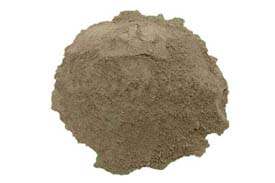
A specific kind of cement with a high alumina content typically greater than 50% is called high alumina refractory cement. It is intended for use in high-temperature situations where ordinary cement would melt under the intense heat. Refractory materials are bonded and sealed in furnaces, kilns, and other industrial equipment that is exposed to extremely high temperatures using high alumina refractory cement. It has a reputation for enduring temperatures above 1,500 degrees Celsius (2,732 degrees Fahrenheit) while retaining strength and integrity.
In sectors like glassmaking, steel manufacturing, and other applications involving high temperatures, high alumina refractory cement is crucial. It is essential to preserving the structural soundness and functionality of industrial machinery subjected to these severe environments. The main source of raw materials for high alumina refractory cement is bauxite. It is made by mixing high alumina cement clinker with low calcium aluminate refractory cement clinker in the right amounts, then grinding the mixture into a fine powder. When mixed with light aggregates, high alumina refractory cement can also be used to create heat-resistant and insulating concrete.
Under IS standard IS 15895:2018, all High Alumina Refractory Cement is now part of the obligatory ISI Certification Scheme.
Without the ISI Mark, this product cannot be marketed, imported, or exported into the Indian consumer market.
Indian Standards Institute, or ISI was renamed the Bureau of Indian Standards (BIS) in 1987. The official mark that the Bureau of Indian Standards provides for manufacturers of various goods is the ISI Mark. It is used to indicate compliance with Indian standards (IS) set by the Bureau of Indian Standards (BIS) and has been used as a conformity marking for industrial products. Manufacturers received permission from BIS to use the ISI Mark on items that comply with relevant Indian requirements through the product certification program.
Only manufacturers (domestic or foreign) who produce the finished product will be awarded ISI Certification. This will not be given to any product importers, traders, dealers, or distributors.
The following documentation is required to get an ISI certification:
For more detailed information, please click here.
There are two approaches for Indian manufacturers to become certified with the ISI Mark:
Regular Procedure
With the possible exception of cases deemed "All India first," which might take up to 180 days, the licensing procedure is expected to be finished in 120 days. This timeline starts on the day the application is received, assuming that at different points in time the documentation, unit assessment, and product conformance are all deemed acceptable.
Step 1: Manufacturing Unit Customization in Compliance with Applicable Indian Standards
Step 2: Submission of the Application Form
For more detailed information, please click here.
Simplified Procedure
This is a much faster process than the standard procedure. After a factory inspection is deemed satisfactory and the initial evaluation establishes that the sample complies with the applicable Indian Standard(s), the license application process is expected to be finished in 30 days.
Step 1: Adapting the Manufacturing Unit to Comply with the Relevant Indian Standard
Step 2: Sample Testing
For more detailed information, please click here
The process of obtaining ISI Mark Certification for Foreign Manufacturers typically includes the following steps:
Step 1: Application
Step 2: Query Raised (If Any)
For more detailed information, please click here.
Brand Liaison provides helpful support for achieving ISI Mark Certification. Among our offerings are:
Please click here to get in contact with our team of specialists for a deeper explanation of the paperwork and steps needed to get ISI Mark Certification.